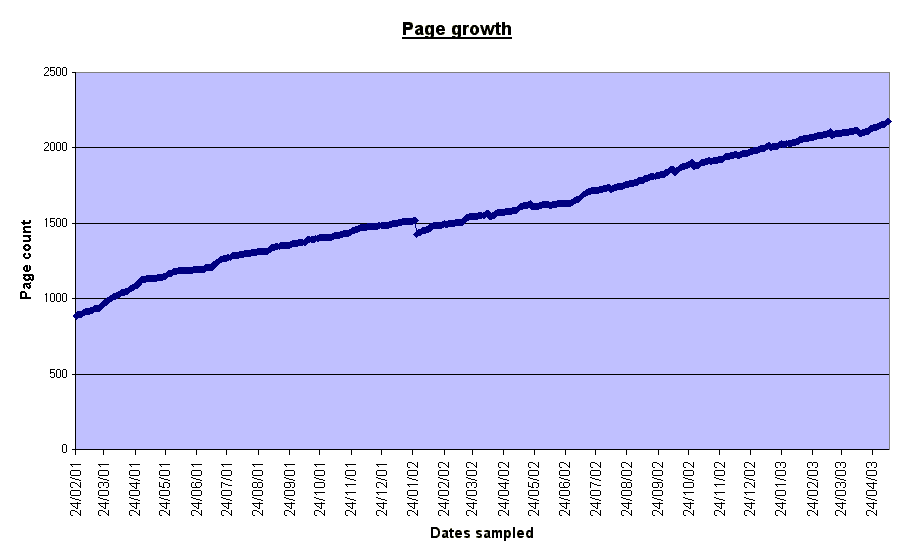![[Home]](http://meatballwiki.org/meatball.gif) MeatballBackgrounder
MeatballBackgrounder
MeatballWiki | RecentChanges | Random Page | Indices | Categories- 1.1. Introduction
- 1.2. MeatballMission
- 1.3. SoftSecurity
- 1.4. Culture
- 1.5. MeatballOutreach
- 1.6. Statistics
- 1.6.1. Hit counts
- 1.6.2. Page growth
- 1.6.3. Google Page Rank
1.1. Introduction
In April 2000, SunirShah founded the MeatballProject to explore "collaborative hypermedia". Mostly, it provided a common space for wiki developers and proprietors from all over the Internet to collaborate.
Wikis are communally editable websites, where every word on every page can be modified by each and every person. They are consequently highly collaborative spaces, where no content is explicitly controlled by any one person. Wikis were first implemented in 1995 as the WikiWikiWeb by Ward Cunningham as a backend to the Portland Pattern Repository. Influenced consequently by Christopher Alexander's A Pattern Language (Oxford University Press, 1977) wikis architecturally are heavily-crosslinked hypertext, where each node in the hypertext represents one concept (e.g. a Pattern). They are identifiable not only by their universal editability, but by their simple "page name is link name" equivalence.
Although the Meatball project is larger than just one website, Meatball's work is predominantly represented by MeatballWiki. MeatballWiki is generously hosted by Clifford Adams, author of the UseModWiki "wiki clone" software, on the UseMod website. SunirShah took on the title Editor. (cf. AboutThisSite) Other parts of Meatball revolve around MeatballWiki, either as supporting web applications or as bridges between it and other projects.
Naturally, MeatballWiki runs on the UseModWiki software. Over time, MeatballWiki has influenced the direction of UseModWiki development greatly. For a long time, MeatballWiki was the largest UseModWiki site. It remains the most influential, as almost all major functional improvements are either discussed on MeatballWiki first or result from a discussion on MeatballWiki.
MeatballWiki's range of influence also impacts many of the other major wiki script developers and wiki proprietors because it has faithfully served as a common space for the developers to collaborate with each other. Wiki leaders being wiki users, we tend to work together.
1.2. MeatballMission
The wide scope of MeatballWiki would initially suggest that Meatball had no mission other than "online culture" and "online communities". It naturally contains technical analyses of indexing schemes, wiki architecture, and inter-wiki protocol design. Yet it also philosophizes about the nature of hypertext, government, and identity, not to mention detailing user interfaces, community building, and conflict resolution.
Although the range of Meatball's discussion ranges widely over the usual topics associated with online culture and organization, it has always had its own perspective. First of all, it serves as a skeletal community role as a place for leaders of other projects (particularly wikis) to congregate and organize. However, from a cultural angle, Meatball emphasizes an understanding of normal social organization and human nature and simplicity for the role of any technology.
The name Meatball came from the analogy that the web looks like a bowl of meatball spaghetti, where the links are the spaghetti and the content is the meatballs. In that respect, Meatball places a premium on content over form. Also, Meatball plays into the distinction amongst early net.culture between "meatspace" and "cyberspace". Meatball doesn't hold that people are aspects or avatars in cyberspace; instead, it remains grounded firmly in meatspace.
Over time, a number of cultural ideologies have emerged. Originally, SunirShah made the choice that even as the founder and Editor of MeatballWiki that he did not want access to the server or special administrative access to the site. At that time, only Clifford could "bend reality" by modifying the backend, and we had agreed that he was expressly forbidden from doing so. A consequence of this choice was that Sunir could not use special technological powers to enforce social control, even banning IPs. Any technical power, such as deleting pages, we insisted on providing equally for everyone. Since wikis do not provide normal users any technological methods to limit participation, this did mean that MeatballWiki was left at the whims of social forces. Yet it also meant that MeatballWiki was not SunirShah's project alone, which proved essential when he became an AbsentLeader for over a year.
To be honest, this was de facto the reality on the WikiWikiWeb, as Ward Cunningham had taken a hands-off approach to managing the site. The main difference--aside from the ability as founder to shape the community--was that we were capable of improving the script ourselves. Instead of piling on feature after feature, though, we wanted to remain consistent with the principles of simplicity and openness that went into the design of wikis in the first place. The result was the soft security pattern language.
1.3. SoftSecurity
Soft security is now the canonical name for the architectural decisions that have gone into wiki design to ensure that their essential openness is not unfortunate naïveté. It flows from a few basic principles.
- AssumeGoodFaith. People are almost always trying to be helpful; so, we trust everyone, confident that occasional bad will be overwhelmed by the good.
- PeerReview. Users, rather than software or sysadmins, moderate each other.
- ForgiveAndForget. Even well intentioned people make mistakes. They don't need to be permanent.
- LimitDamage. When mistakes are made, minimize the damage.
- FairProcess. The theory that being transparent and giving everyone a voice are essential management skills. (cf. Chan Kim and Renée Mauborgne, "Fair Process: Managing in the Knowledge Economy." Harvard Business Review January-February 1997 pp65-75.)
These principles have inspired a number of solutions to common problems. Almost all solutions rely almost totally on people to do the right thing. Technology is only introduced to assist the people in their work. Because soft security relies entirely on social forces to maintain order, it remains not only adaptable to new threats, but tolerant in its responses. Conversely, encoded, programmatic ("hard") security is incapable of distinguishing attacks from mistakes, nor can it be argued with, nor can it be held accountable. Generally, soft security seeks to be humane and liberalist rather than impersonally technocratic.
The most important examples:
- Audit trail. All changes are logged publicly.
- Reversible change. All changes are reversible by anybody. Even reverted changes are themselves reversible.
Based on these two alone, almost all problems can be solved. The audit trail allows peer review. The reversible changes gives people the confidence to do anything knowing they cannot do permanent harm, and that their mistakes can be forgotten. The public nature gives everyone the opportunity to have a voice, as well as enabling the Samaritans to squelch any abuse. Contrasted with normal Internet moderation, where either nothing is done or only some privileged person can unilaterally control the text, we have found that this system is much less vulnerable to malfeasance or human error.
We have made a few important technical advances in soft security on MeatballWiki. The most important advance being an idea I had during a discussion about version histories. Kept pages tracks all changes to the site, but forgets changes older than two weeks. This allows us to revert undesirable changes while "forgiving and forgetting" regrettable exchanges. Moreover, inspired by kept pages, we also derived safe ways to devolve power to the public to make destructive changes, such as deleting pages, as well as allowing the public to safely change central system files on the server. Simply stated, only if after two weeks no one vetoes a motion to make a destructive change, the system will carry it out.
Since the initial construction of the soft security pattern language, it has gone on to influence a few other domains, such as AdamShand's PersonalTelco "guerilla network" project and RustyFoster's discussion salon, kuro5hin.org. It has been compared to religious perspectives, such as Jain Ahimsa, and the Zen metaphor "bend like water".
1.4. Culture
MeatballWiki is meant to serve as a repository of advice and analysis for the full range of wiki concerns. As a result, and because Meatball is determinedly ideological, it is forced to research a better understanding of and develop better processes for managing volunteer organizations.
Meatball contains a small yet growing corpus of management advice. For instance, as mentioned above, it is founded on Kim and Mauborgne's theory of Fair Process. We have also written an extensive pattern language for conflict resolution, an essential skill when you can only rely on social means of control. We have been slowly growing an analysis of power as well.
Management isn't the only concern, however. MeatballWiki also contains analysis of cultural practices that have evolved on wikis, and it continues to develop new analysis. It also has a culture of its own. For instance, our most central tenet is our metaphoric motto of treating collaboration on MeatballWiki as BarnRaising. We also adamantly hold to a no pseudonyms policy: we ask that everyone use her real name or post anonymously. We take it as a point of pride to welcome every new user personally.
Most recently, on the occasion of our third anniversary, SunirShah created the BarnStar award for exceptional "barn raising". Anyone can give these awards to anyone at any time in the typical wiki way: just edit their homepage. While this may sound trivial, it serves important purposes:
- It (re)creates a community expectation of showing appreciation, an important aspect of teamwork.
- It remembers appreciation of work that typically remains unsigned and unaccredited long after evidence of the work disappears from the collective consciousness.
- By being a visible public monument to the work that went into the site, it provides tangible examples for others to follow.
- It further encourages identifying oneself, rather than remaining anonymous.
The BarnStar award is important to contrast with those projects that forget how important the social aspects of teamwork are to organization. Keeping people interested in working and teaching new people how to carry on the work are critical.
1.5. MeatballOutreach
Meatball serves in the wider context of the general wiki community on the Internet, not to mention other collaborative projects. Almost all contributors have some principal role on another project. Even those that don't often are interested in influencing other projects they belong to. Aside from these soft relationships to other projects, Meatball has participated directly in a number of other projects.
For a full list, see http://meatballwiki.org/wiki/MeatballOutreach.
1.6. Statistics
Although the project has always preferred doing quality work than generating quantifiable results, the following will hopefully give an understanding of the impact of Meatball.
1.6.1. Hit counts
Over the past three years, the project has put the relatively unknown usemod.com on the map. When it first started, usemod.com received no more than 1000 visits a month, mostly from Clifford Adams, the owner. As the following charts indicate, growth has been explosive since then. Now, usemod.com receives on average 200 000 hits per month, with MeatballWiki being the most visited part of the site, gaining around 90 000 hits a month.

Website statistics, usemod.com, from December 1999 to December 2000.

Website statistics, usemod.com, from December 2000 to December 2001.

Website statistics, usemod.com, from December 2001 to December 2002.

Website statistics, usemod.com, from December 2002 to December 2003.
In terms of unique visitors, in the 31 days prior to May 11, 2003, MeatballWiki received 11888 unique visitors in total. We specifically had 1991 unique visitors to the front page, and 1310 to the all important RecentChanges page. Other top scorers included our list of indexing schemes, my diary, and the tour bus central stop hosted on MeatballWiki.
We had 1433 edits made to the site in the 31 days prior to May 11, 2003. These were made by 181 unique IP addresses. Conservatively lumping dynamic IP addresses together, I estimate 134 unique editors over the past month. Of these, 24 identified themselves by signing in with their real names, of which one used a pseudonym before being asked to use his real name. One person used a pseudonym and hasn't returned to identify himself.
Finally, we had 6317 external referrals from 2122 sources to 2491 targets in the 31 days prior to May 11, 2003.
These statistics should indicate that not only is MeatballWiki not an isolated project, but that it isn't an effort by only a small number of people either.
1.6.2. Page growth
Part of the MetaWiki search engine's function is to collect statistics on the wikis it indexes. From this data, we can chart the page growth of MeatballWiki.

Although this graph doesn't demonstrate the size of each page, and consequently the depth of MeatballWiki, it does show consistent growth.
Note also the dips. These indicate dates when the system maintenance scavenged deleted pages. Note in particular the first major dip on January 27, 2002, after the first application of our page deletion mechanism when 90 pages were deleted.
1.6.3. Google Page Rank
Google's patented Page Rank algorithm roughly measures the popularity of sites in its database. Simply by searching on Google, one can measure roughly how popular a website is relative to others in the same category. On May 11, 2003, the following results were obtained:
| Search term | Rank | Total results | Comments |
| meatball | 1 | 114 000 | We co-opted even a generic word like meatball. |
| transclusion | 1 | 5180 | Ted Nelson's famous term from Xanadu. |
| wikilog | 1 | 20 800 | A fusion of wikis and weblogs. |
| wiki | 8 | 2 790 000 | We're one of the top ten wikis. |
| slashdot | 25 | 2 910 000 | Slashdot is the most famous weblog. |
| weblog | 102 | 3 290 000 | Nearly Top 100 amongst the current hot media technology. |
What this shows is that MeatballWiki has a fairly high rating by Google. High enough, indeed, to place significantly in results not directly related to its focus, such as with weblogs, particularly (and surprisingly) Slashdot.
1.7. Conclusion
Meatball has not only worked on the basic technical problems associated with organizing information in a hypertext, but also the social aspects such as the cultural and managerial aspects. This fundamentally holistic approach to design has pushed it to research and analyze a very wide range of concerns. It has pushed Internet discourse to be open and collaborative, much like open source has pushed forward an agenda for software. With the soft security pattern language in particular, it demonstrates alternatives to online regulation other than the inflexible technical solutions regularly offered. As time goes forward, the project will continue to provide a steady hand on the Internet today where wikis as knowledge management tools are becoming de rigeur.
The above text is PrimarilyPublicDomain.
CategoryMeatballWiki